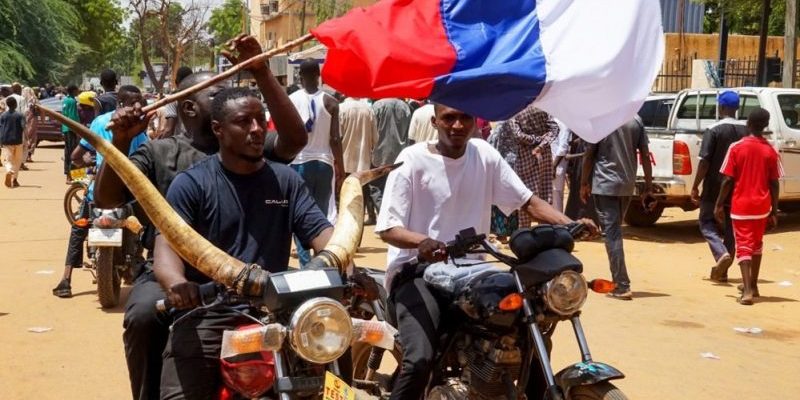The junta that seized power in Niger last week detained senior politicians on Monday (31 July), their party said, defying international calls to restore democratic rule, while fellow military rulers in West Africa expressed their support.
The overthrow of President Mohamed Bazoum has sent shockwaves across West Africa, pitting Niger’s former Western allies against the likes of Russia and other junta leaders in the region.
The European Union on Monday condemned the arrest by Niger’s new junta of ministers from the ousted government and demanded they be freed immediately.
The party of deposed President Mohamed Bazoum warned that the West African country risked becoming a “dictatorial and totalitarian regime” after a series of arrests.
The PNDS party said the ministers for oil and mining were detained, along with the head of its national executive committee.
“The EU denounces the continuing arrests of Ministers and senior officials of President Mohamed Bazoum’s government by the putschists in Niger,” EU foreign policy chief Josep Borrell posted on social media.
“We call for their immediate release.”
The EU has condemned the armed takeover in Niger, a country it had seen as a key bulwark of stability in the volatile Sahel region.
The 27-nation bloc has suspended budgetary support to Niamey and warned it could impose further sanctions over the coup.
Bazoum, a western ally whose election just over two years ago marked Niger’s first peaceful transition of power since independence, was toppled on July 26 by the elite Presidential Guard.
Russian flags
Last Wednesday’s coup has raised fears for the security of the Sahel region. Niger is the world’s seventh-biggest producer of uranium, the radioactive metal widely used for nuclear energy and treating cancer.
The United States, former colonial power France and other Western states have troops in Niger and had been working with the government to overcome an Islamist insurgency by groups linked to Islamic State and al Qaeda.
But attacks on civilians and soldiers persist, fomenting discontent and straining relations with Western powers.
There have been four takeovers in neighbouring Mali and Burkina Faso during the last two years, all of which have come amid frustrations about growing insecurity. Both countries have turned increasingly towards Russia as an ally.
The coup leaders, who have named General Abdourahamane Tiani, the former presidential guard chief, as head of state, said they overthrew Bazoum over poor governance and discontent with the way he handled the Islamist threat.
On Sunday, supporters of the junta burned French flags and attacked the French embassy in Niger’s capital, Niamey, prompting police to fire volleys of tear gas in response.
Yevgeny Prigozhin, the head of Russia’s Wagner mercenary group, last week welcomed the coup in Niger, and said his forces were available to restore order.
The Kremlin said on Monday that the situation in Niger was “cause for serious concern” and called for a swift return to constitutional order.
Economic pinch
ECOWAS appears to have taken a tougher stance towards Niger than its junta-led neighbours, which have been sanctioned but never threatened with force.
Both the EU and France have backed the bloc’s response suspended their own financial support, while the US has threatened to do so.
“The EU and Niger share deep ties developed over decades. The unacceptable attack on the democratically elected government puts these ties in jeopardy,” European Commission President Ursula von der Leyen posted on X, the platform formerly known as Twitter.
After days of turmoil, the International Monetary Fund said it was closely monitoring developments in Niger. But the IMF has not yet taken any specific actions in response to the coup.
It has yet to disburse a $131.5 million loan to Niger that was approved on 5 July, it added.
The regional central bank has meanwhile cancelled Niger’s planned 30 billion CFA ($51 million) bond issuance, scheduled for Monday in the West African regional debt market, following sanctions, sources said.

